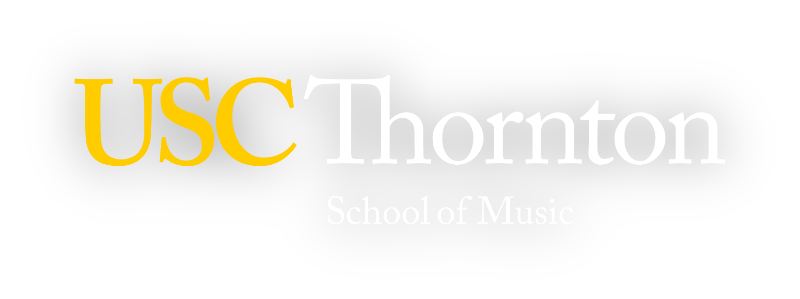The Program
USC Thornton's Department of Screen Scoring offers a two-semester master of music program that benefits from its location in the center of the Los Angeles film and television community. Founded by the renowned composer, USC Distinguished Professor Morten Lauridsen, the Scoring for Motion Pictures and Television graduate-certificate program was launched in the mid 1980s. For most of the next 15 years, the program was directed by the highly regarded composer and Disney Studios Music Director, Buddy Baker. Upon Buddy's untimely passing in 2002, his mentee, composer and SMPTV Associate Professor Brian King, took up the torch and, over the subsequent 10 years, upgraded the program with new courses and faculty. In 2012, award-winning industry veteran, Daniel Carlin assumed the reins. Under Professor Carlin's leadership, the program has solidified its relationship with the USC School of Cinematic Arts, expanded its curriculum and funding, replaced the graduate certificate with a master of music degree, and changed its name to Screen Scoring to reflect the training provided in music for video games as well as for movies and television.
Our students compose music for approximately 10 course-related recording and scoring sessions that are held in industry-favored recording studios throughout the Los Angeles area, including Silent Zoo, Capitol Studios, and the Warner Bros. Clint Eastwood Scoring Stage. These sessions are comprised of ensembles as small as 5 and as large as 65, and all of these players are first-call studio musicians. Professional orchestra managers (contractors) ensure that all of our recording sessions are conducted in accordance with guidelines established by Local 47 of the American Federation of Musicians, with whom we are proudly affiliated. We are grateful to receive the generous, professional support and collaboration of the union's talented member players and to work with their outstanding orchestra managers, especially Peter Rotter, along with Gina Zimmitti, Reggie Wilson, Mark Robertson, David Low, Noah Gladstone, and others. These sessions are jointly supervised and produced by the course faculty member and the program's director. The music is recorded and mixed by such award-winning industry engineers as Bobby Fernandez, Joel Iwataki, Dick McIlvery, Dennis Sands, and Fred Vogler, among others. In addition, each of our scoring students composes and produces music for a minimum of 5 projects created by upper-division and graduate students in the School of Cinematic Arts, ranging from live-action narratives and documentaries to animation and video games. Those recording sessions generally are held on campus at the John Williams Scoring Stage with Thornton School of Music instrumentalists, and they are recorded by engineers from the School of Cinematic Arts.
Our faculty consists of working professionals from all genres within the industry and includes composers, orchestrators, conductors, programmers, music supervisors, music editors, engineers, copyists, and journalists involved in movies, television, and video games. Our curriculum includes course offerings and/or workshops and master classes in orchestral and electronic scoring in all genres; recording, mixing, and editing; music preparation; technology; film- and television-music history; business; collaboration; and entrepreneurialism. We also participate in the Thornton School mentorship program in which a few students from each Thornton program are selected for mentorship by industry members of Thornton's Board of Councilors.
Additionally, each week throughout the academic year, our students attend private lessons and the affiliated weekly Composition Forum Lab, which provides them with approximately 30 opportunities to interact with industry professionals, including composers and other film-music workers, directors and film editors. Usually one or two of these sessions are held in the studios of working composers. (Please click here for a listing of some of our honored forum guests.)
In summary, with a major emphasis on composition, collaboration, and production, both on campus and in the larger Hollywood community, our scoring students are able to learn, participate, and network in important ways that prepare them for numerous career options in this multimedia marketplace.


